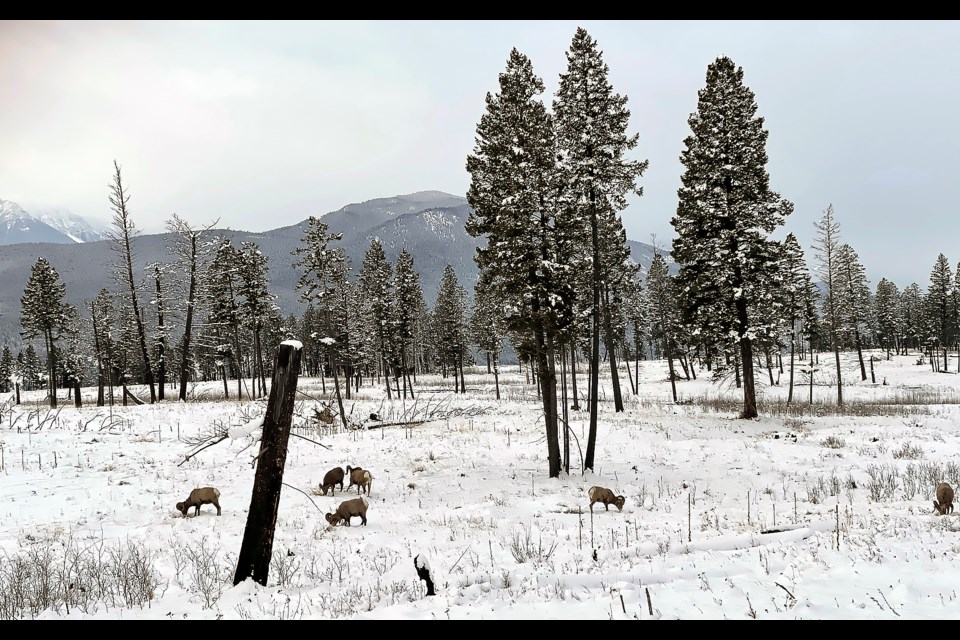KOOTENAY NATIONAL PARK, ALTA – A treasured bighorn sheep herd that spends much of its time in Kootenay National Park is being killed on the highway outside the park near Radium Hot Springs, B.C.
The Radium–Stoddart herd has seen its population drop by about half in the last 20 years, currently down to about 130 individuals following a spike of 13 highway deaths since November, the majority on Radium Hill south of the village.
Parks Canada wildlife experts say wildlife populations, including bighorn sheep, fluctuate over time due to hunting by predators, illness and disease, severe winters or lack of food, but the high road mortality is a worry.
“This number of road mortalities is a concern,” said David Laskin, a wildlife ecologist for Lake Louise, Yoho and Kootenay field unit.
From January to December 2021, 13 bighorn sheep were killed on Highway 93/95 near Radium with another eight killed in the first two months of 2022. One of the accidents that resulted in a sheep's death last month also landed a man in hospital.
The herd’s population declined from a high of 250 in 2003 to a low of 120 in 2019. The current estimate is approximately 130 sheep.
The province of British Columbia declined an interview request and instead sent an emailed statement, noting bighorn sheep highway mortality has been an issue in the Radium area since the early 1990s.
According to the B.C. Ministry of Forests, Lands, Natural Resource Operations and Rural Development, the primary and consistent cause of mortality is vehicle collisions on Highway 93/95.
“The average number of bighorn sheep killed annually in the Radium area due to collisions with motor vehicles from 2001 to 2020 is 9.5 sheep,” according to the statement.
Ministry officials say salt brine de-icer that is applied on the highway in winter conditions can be an attractant for sheep.
In addition, they say the snow accumulations and deep and crusty conditions in the Radium area this winter led sheep to use slopes above the highway as foraging habitat.
“The sheep were crossing the highway more often than normal to access these slopes,” said the ministry in the email. “Flatter, more common habitats have not been useable for foraging due to the snow conditions.”
Bighorn sheep use habitats on both sides of Highway 93/95 from late September until late May.
Sheep tend to focus their activity primarily along the west side where there is good foraging habitat and some escape terrain.
“They also tend to use the town to avoid predators as usually fewer predators exist within urban landscapes,” according to the statement.
Above the east side of the highway are grassy slopes, which are used as foraging habitat during the winter and spring.
These slopes have lower snow accumulations and green-up early, providing early spring forage. The upper levels of the east side provide mid to late spring foraging habitat.
Most bighorn sheep leave Radium in mid to late May and migrate into high elevation habitats in Kootenay National Park for the late spring and summer.
“In winter, they’re spending more time out of the park, and in spring during lambing season and summer, they are moving into higher elevations into the park,” said Laskin.
“Being at the lower elevations in winter there’s more food availability, and they might be finding more security around built-up areas in the townsite.”
This winter, the Ministry of Transportation and Infrastructure in partnership with the Ministry of Forests, Lands, Natural Resource Operations and Rural Development have been implementing short-term measures to try to limit the number of sheep dying on the highway.
They have been trying to draw the herd away from the highway through alternative salt licks, and have also installed additional signage and beefed up on-site monitoring via truck patrols during periods of high traffic volumes.
The ministry spokesperson said conceptual plans for fencing and construction of a wildlife overpass at Mile Hill have been substantially completed.
“The ministry is actively working to identify funding for this project,” they wrote.
The Village of Radium Hot Springs has committed to funding 10 per cent of the overpass, which currently comes with a $4 million price tag.
The $400,000 investment by the village has also prompted an online fundraising campaign called Help the Radium Bighorn herd.
Laskin said Parks Canada continues to work with the province of B.C. to manage the bighorn sheep herd.
He said Parks Canada has taken action to restore optimal sheep habitat inside Kootenay National Park through forest thinning, prescribed fire and improving sightlines on game trails.
“We’re trying to draw the herd into the park during the winter and out of the Radium townsite and away from the highway,” he said.



